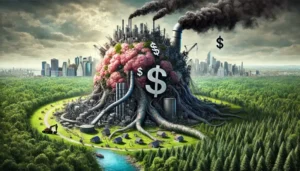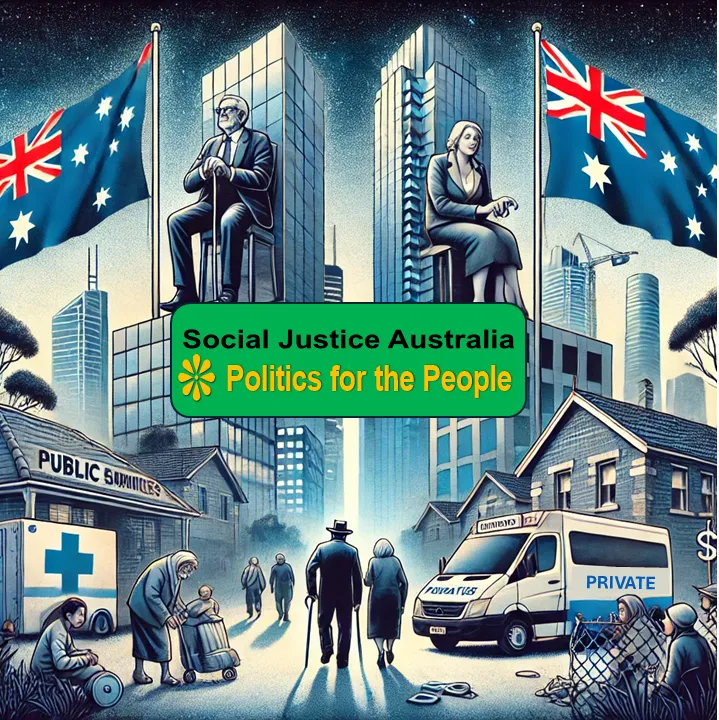Description
Learn how neoliberalism in Australia has shaped the economy, public services, and democracy—and what can be done to challenge its influence.
Introduction

Neoliberalism has profoundly shaped Australia’s political and economic landscape for decades. Rooted in the belief that free markets and minimal government intervention drive prosperity, neoliberal policies have led to widespread privatisation, deregulation, and cuts to public services.
While touted as necessary for economic growth, these policies have also increased inequality, weakened job security, and undermined essential services like healthcare, education, and housing.
This article will explore how neoliberalism has evolved in Australia, its impact on citizens, and what can be done to challenge its dominance.
The Core Principles of Neoliberalism in Australia
Market-Driven Policies Over Public Good
Neoliberalism in Australia prioritises corporate profits and economic efficiency over public welfare. This ideology assumes that markets will self-regulate and produce the best outcomes. However, the dominance of market-driven policies has:
• Shifted essential services like energy and telecommunications to profit-driven entities.
• Increased economic inequality as corporate profits soar while wages stagnate.
• Weakened public accountability as private interests override community needs.
Privatisation of Public Services and Assets
Neoliberal governments have aggressively sold off public assets, often under the guise of efficiency. Key privatisations include:
• Commonwealth Bank: Sold in the 1990s, removing a government-owned alternative to private banking.
• Qantas: The national airline was privatised, prioritising shareholder profits over national interests.
• Electricity and Gas Networks: State governments sold off essential utilities, leading to price hikes and service reductions.
• Public Transport: Many bus and rail networks have been outsourced, often at the expense of affordability and reliability.
Deregulation and Weakening of Workers’ Rights
Neoliberalism promotes deregulation to increase competition, but in practice, it has:
• Reduced wages and job security through casualisation and gig economy jobs.
• Undermined unions, making it harder for workers to bargain collectively.
• Led to exploitative employment conditions, particularly in retail, hospitality, and aged care.
Corporate Tax Cuts and Wealth Redistribution Upwards
Neoliberal policies favour tax reductions for corporations and high-income earners, arguing that wealth trickles down. However, this has resulted in:
• A shrinking tax base, leading to cuts in public services.
• Rising economic inequality as the wealthy accumulate more assets.
• Increased reliance on indirect taxes like the GST, disproportionately affecting lower-income Australians.
The History of Neoliberalism in Australian Politics
The Hawke-Keating Era (1983–1996): The Beginning of Neoliberal Reform
• Floated the Australian dollar and deregulated the financial sector.
• Introduced enterprise bargaining, weakening collective wage negotiations.
• Privatised key national assets, setting a precedent for future governments.
The Howard Years (1996–2007): Expanding Neoliberalism
• Further privatisation, including Telstra.
• Work Choices legislation weakened workers’ rights and job security.
• Increased corporate influence on policymaking.
The Rudd-Gillard Era (2007–2013): Temporary Relief, Continued Market Policies
• Rudd’s stimulus package cushioned the Global Financial Crisis but kept neoliberal structures.
• Gillard’s education reforms increased funding to private schools over public institutions.
The Abbott-Turnbull-Morrison Era (2013–2022): Corporate Dominance
• Tax cuts for corporations and high-income earners.
• Cuts to welfare and Medicare.
• Inaction on housing affordability and climate change.
The Albanese Government (2022–Present): Status Quo or Change?
• While promising reform, many neoliberal policies are still in place.
• Housing and cost-of-living crises stay unaddressed.
The Impact of Neoliberalism on Everyday Australians
Decline of Public Services
• Healthcare: Bulk-billing doctors are becoming scarce, increasing out-of-pocket expenses.
• Education: TAFE funding cuts and university fee hikes restrict access to quality education.
• Public Transport: Privatisation has led to service reductions and fare increases.
Housing Crisis and Cost-of-Living Pressures
• Property speculation and tax incentives for investors have driven housing prices beyond affordability.
• Public housing investment has stagnated while homelessness rates climb.
• Essential services like electricity and internet have become more expensive.
Job Insecurity and Wage Stagnation
• More Australians are employed in part-time and casual work with fewer benefits.
• Wage growth has not kept pace with inflation.
Corporate Influence on Government
• Mining and fossil fuel industries exert enormous influence over policies.
• Political donations from corporations shape government decisions.
Resistance to Neoliberalism in Australia
Public Opposition and Growing Discontent
• Increasing protests against cost-of-living pressures.
• Growing calls for renationalisation of essential services.
Political Movements Challenging Neoliberalism
• Rise of minor parties and independents, challenging corporate influence.
• Advocacy groups pushing for policy changes in housing, wages, and public investment.
Alternative Economic Models for Australia
• Modern Monetary Theory (MMT): Recognising Australia’s currency sovereignty to fund public investment.
• Public Banking: Re-establishing a government-owned bank to compete with private banks.
• Wealth Redistribution: Reforming tax policies to address inequality.
Moving Beyond Neoliberalism: What Needs to Change?
• Investing in public infrastructure and essential services.
• Strengthening workers’ rights through fair wage policies.
• Implementing corporate tax reform and stricter regulations on political donations.
• Rejecting austerity and embracing public-led economic growth.
Conclusion
Neoliberalism in Australia has transformed the economy, often at the expense of ordinary citizens. While it has helped corporations and the wealthy, it has led to growing inequality, declining public services, and widespread discontent.
Australia’s future depends on challenging these policies and advocating for a fairer, more inclusive economic model.
Call to Action
Do you see opportunities for community-driven change in Australia’s dollar sovereignty?
If you found this article insightful, explore more about political reform and Australia’s monetary sovereignty on Social Justice Australia: https://socialjusticeaustralia.com.au/
Share this article with your community to help drive the conversation toward a more just and equal society.
Click on our Reader Feedback menu. Let us know how our content has inspired you.
Additionally, leave a comment about this article below.
Support Social Justice Australia – Help Keep This Platform Running
Social Justice Australia is committed to delivering independent, in-depth analysis on critical issues affecting Australians. Unlike corporate-backed media, we rely on our readers to sustain this platform.If you find value in the content we provide, consider making a small donation to help cover the costs of hosting, maintenance, and continued research. Every contribution—no matter how small—makes a real difference in keeping this site accessible and ad-free.
💡 Your support helps:
✅ Keep this website running without corporate influence
✅ Fund research and publishing of articles that challenge the status quo
✅ Expand awareness of policies that affect everyday Australians
💰 A one-time or monthly donation ensures Social Justice Australia stays a strong, independent voice.
🔗 Donate Now
Thank you for being part of this movement for change. Your support is truly appreciated!

